- Home
- Iain M. Banks
The Wasp Factory Page 13
The Wasp Factory Read online
Page 13
I watched the wires wash and roll themselves to one side of the flood’s course, then looked at the front of the racing water as it headed quickly for the sea over the long-dried sand. I sat down opposite where the first village had been, where long brown humps of water surged, slowly advancing, and waited for the storm of water to subside, my legs crossed, my elbows on my knees and my face in my hands. I felt warm and happy and slightly hungry.
Eventually, when the stream was almost back to normal and there was virtually nothing left of my hours of work, I spotted what I was looking for: the black and silver wreck of the bomb, sticking ripped and gnarled in the sand just downstream from the site of the dam it had destroyed. I didn’t take my boots off but, with the tips of my toes still on the dry bank, walked with my hands until I was almost at full stretch out in the middle of the stream. I picked the remains of the bomb out of the stream bed, put its jagged body carefully into my mouth, then walked my hands back until I was able to throw myself back and stand up.
I wiped the almost flat piece of metal with a rag from the War Bag, put the bomb inside the bag, then collected the wasp jar and went back to the house for tea, leaping the stream just up from the highest point the waters had been backed up to.
All our lives are symbols. Everything we do is part of a pattern we have at least some say in. The strong make their own patterns and influence other people’s, the weak have their courses mapped out for them. The weak and the unlucky, and the stupid. The Wasp Factory is part of the pattern because it is part of life and - even more so - part of death. Like life it is complicated, so all the components are there. The reason it can answer questions is because every question is a start looking for an end, and the Factory is about the End - death, no less. Keep your entrails and sticks and dice and books and birds and voices and pendants and all the rest of that crap; I have the Factory, and it’s about now and the future; not the past.
I lay in bed that night, knowing the Factory was primed and ready and waiting for the wasp that crawled and felt its way about the jar that lay by my bedside. I thought of the Factory, above me in the loft, and I waited for the phone to ring.
The Wasp Factory is beautiful and deadly and perfect. It would give me some idea of what was going to happen, it would help me to know what to do, and after I had consulted it I would try to contact Eric through the skull of Old Saul. We are brothers, after all, even if only half so, and we are both men, even if I am only half so. At some deep level we understand each other, even though he is mad and I am sane. We even had that link I had not thought of until recently, but which might come in useful now: we have both killed, and used our heads to do it.
It occurred to me then, as it has before, that that is what men are really for. Both sexes can do one thing specially well; women can give birth and men can kill. We - I consider myself an honorary man - are the harder sex. We strike out, push through, thrust and take. The fact that it is only an analogue of all this sexual terminology I am capable of does not discourage me. I can feel it in my bones, in my uncastrated genes. Eric must respond to that.
Eleven o’clock came, then midnight and the time signal, so I turned the radio off and went to sleep.
8
The Wasp Factory
In the early morning, while my father slept and the cold light filtered through the sharp overcast of young cloud, I rose silently, washed and shaved carefully, returned to my room, dressed slowly, then took the jar with the sleepy-looking wasp in it up to the loft, where the Factory waited.
I left the jar on the small altar under the window and made the last few preparations the Factory required. Once that was done I took some of the green cleaning jelly from the pot by the altar and rubbed it well into my hands. I looked at the Time, Tide and Distance Tables, the little red book that I kept on the other side of the altar, noting the time of high tide. I set the two small wasp candles into the positions the tips of the hands of a clock would have occupied on the face of the Factory if showing the time of local high tide, then I slid the top off the jar a little and extracted the leaves and the small piece of orange peel, leaving the wasp in there alone.
I set the jar on the altar, which was decorated with various powerful things; the skull of the snake which killed Blyth (tracked down and sliced in half by his father, using a garden spade - I retrieved it from the grass and hid that front part of the snake in the sand before Diggs could take it away for evidence), a fragment of the bomb which had destroyed Paul (the smallest bit I could find; there were lots), a piece of tent fabric from the kite which had elevated Esmerelda (not a piece of the actual kite of course, but an off-cut) and a little dish containing some of the yellow, worn teeth of Old Saul (easily pulled).
I held my crotch, closed my eyes and repeated my secret catechisms. I could recite them automatically, but I tried to think of what they meant as I repeated them. They contained my confessions, my dreams and hopes, my fears and hates, and they still make me shiver whenever I say them, automatic or not. One tape recorder in the vicinity and the horrible truth about my three murders would be known. For that reason alone they are very dangerous. The catechisms also tell the truth about who I am, what I want and what I feel, and it can be unsettling to hear yourself described as you have thought of yourself in your most honest and abject moods, just as it is humbling to hear what you have thought about in your most hopeful and unrealistic moments.
Once I had gone through this I took the wasp without further ado to the underside of the Factory, and let it in.
The Wasp Factory covers an area of several square metres in an irregular and slightly ramshackle tangle of metal, wood, glass and plastic. It is all based around the face of the old clock which used to hang over the door of the Royal Bank of Scotland in Porteneil.
The clock face is the most important thing I have ever recovered from the town dump. I found it there during the Year of the Skull and rolled it home down the path to the island and rumbled it over the footbridge. I stored it in the shed until my father was away for the day, then I strained and sweated all day to get it up into the loft. It is made of metal and is nearly a metre in diameter; it is heavy and almost unblemished; the numerals are in roman script and it was made along with the rest of the clock in Edinburgh in 1864, one hundred years exactly before my birth. Certainly not a coincidence.
Of course, as the clock looked both ways, there must have been another face, the other side of the clock; but, although I scoured the dump for weeks after I found the face I do have, I never did discover the other one, so that it, too, is part of the mystery of the Factory - a little Grail legend of its own. Old Cameron in the ironmonger’s shop in the town told me that he heard a scrap-metal dealer from Inverness took the workings of the clock, so perhaps the other face was melted down years ago, or now adorns the wall of some smart house on the Black Isle built from the profits of dead cars and the varying price of lead. I’d rather the former.
There were a few holes in the face which I soldered up, but I left the hole in the dead centre where the mechanism connected with the hands, and it is through that the wasp is let into the Factory. Once there it can wander about the face for as long as it likes, inspecting the tiny candles with its dead cousins buried inside if it likes, or ignoring them if it would rather.
Having made its way to the edge of the face, though, where I have sealed it with a wall of plywood two inches high, topped with a metre-circle of glass I had the glazier in the town make specially, the wasp can enter one of twelve corridors through little wasp-sized doors, one opposite each of those - to the wasp - vast numerals. If the Factory so chooses, the weight of the wasp trips a delicate see-saw trigger made from thin pieces of tin can, thread and pins, and a tiny door closes behind the insect, confining it to the corridor it has chosen. Despite the fact that I keep all the door mechanisms well oiled and balanced, and repair and test them until the slightest tremor sets them off - I have to tread very lightly when the Factory is doing its slow and deadly work - sometimes
the Factory does not want the wasp in its first choice of corridor, and lets it crawl back out on to the face again.
Sometimes the wasps will fly, or crawl upside down on the bottom of the circle of glass, sometimes they stay a long time by the closed-off hole in the centre through which they enter, but sooner or later they all choose a hole and a door which work, and their fate is sealed.
Most of the deaths the Factory has to offer are automatic, but some do require my intervention for the coup de grâce, and that, of course, has some bearing on what the Factory might be trying to tell me. I must pull the trigger on the old air-gun, if the wasp crawls down it; I must turn on the current if it falls into the Boiling Pool. If it ends up crawling into the Spider’s Parlour or the Venus Cave or the Antery, then I can just sit and watch nature take its course. If its path takes it to the Acid Pit or the Ice Chamber or the rather jocularly named Gents (where the instrument of ending is my own urine, usually quite fresh), then again I can merely observe. If it falls into the many charged spikes of the Volt Room, I can watch the insect get zapped; if it trips the Deadweight, I can watch it get crushed and ooze; and, if it stumbles through to the Blade Corridor, I can see it chopped and writhe. When I have some of the alternative deaths attached I can watch it tip molten wax over itself, see it eat poisoned jam or be skewered on a pin propelled by a rubber band; it can even set off a chain of events which ought to end with it trapped in a sealed chamber blasted by carbon dioxide from a soda-syphon bulb, but if it should choose either the hot water or the rifled length of the Twist of Fate, then I have to take a direct part in its death. And, if it goes for the Fiery Lake, it is me who has to press the rod which flicks the lighter which ignites the petrol.
Death by fire has always been at Twelve, and it is one of the Ends never replaced by one of the Alternatives. I have signified Fire as Paul’s death; that happened near to midday, just as Blyth’s exit by venom is represented by the Spider’s Parlour at Four. Esmerelda probably died by drowning (the Gents), and I put her time of death arbitrarily at Eight, to keep things symmetrical.
I watched the wasp come up out of the jar, under a photograph of Eric I had placed face down on the glass. The insect wasted no time; it was up on the face of the Factory in seconds. It crawled over the maker’s name and the year the clock was born, ignored the wasp candles totally, and went more or less straight for the big XII, over that and through the door opposite, which snicked quietly closed behind it. It went at a fast crawl down the corridor, through the lobster-pot funnel made from thread which would stop it from turning back, then entered the highly polished steel funnel and slipped down into the glass-covered chamber where it would die.
I sat back then, sighing. I pushed a hand through my hair and leaned forward again, watching the wasp where it had fallen as it clambered about the blackened and rainbow-coloured bowl of steel mesh which had been sold as a tea-strainer but now hung over a bowl of petrol. I smiled ruefully. The chamber was well ventilated with many small holes in the metal top and bottom of the glass tube, so that the wasp would not choke on the petrol fumes; a slight odour of petrol could usually be sensed when the Factory was primed, if you put your mind to it. I could smell that petrol as I watched the wasp, and perhaps there was just a trace of drying paint in the atmosphere, too, though I couldn’t be sure. I shrugged to myself and pushed down on the chamber button, so that a length of dowelling slid down its guide of aluminium tent-pole and came into contact with the wheel and gas-release mechanism on top of the disposable lighter poised over the pool of petrol.
It didn’t even need a few tries to catch; it went first time, and the thin flames, still quite bright in the early gloom of the morning-lit loft, curled and licked about the open mesh of the strainer. The flames did not go through, but the heat did, and the wasp flew up, buzzing angrily above the silent flames, bumping against the glass, falling back, hitting the side of the strainer, going over the edge, starting to fall into the flames, then flying back up again, knocking off the steel tube of the funnel a few times, then falling back into the steel-mesh trap. It leaped up a final time, flew hopelessly for a few seconds, but its wings must have been singed, because it was crazily erratic in its flight and soon fell into the gauze bowl and died there, struggling, then curling, then staying still, smoking slightly.
I sat and watched the blackened insect bake and crisp, sat and watched the calm flames rise to the mesh and fan round it like a hand, sat and watched the reflection of the little quivering flames on the far side of the glass tube, then at last reached over, unclipped the base of the cylinder, slid the petrol-dish toward me under a metal cover and snuffed the fire. I undid the top of the chamber and reached in with a pair of tweezers to remove the body. I placed it in a matchbox and put that on the altar.
The Factory does not always give up its dead; the acid and the ants leave nothing, and the Venus fly-trap and the spider give back only a husk, if anything. Again, though, I had a burned body; again I would have to do some disposing. I put my head in my hands, rocking forward on the small stool. The Factory surrounded me, the altar was at my back. I gazed round the Factory’s paraphernalia of places, its many ways to death, its crawl-ways and corridors and chambers, its lights at the ends of tunnels, its tanks and containers and hoppers, its triggers, its batteries and threads, supports and stands, tubes and wires. I clicked a few switches, and tiny propellers whirred down branch-corridors, sending air sucked down vents over thimblefuls of jam and down towards the face. I listened to them for a while, until I could smell jam myself, but that was to tempt slow wasps to their ends, and not for me. I turned the motors off.
I started switching everything off; disconnecting, emptying and feeding. The morning was growing stronger in the space beyond the skylights, and I could hear a couple of early birds calling in the new fresh air. When the ritual standing-down of the Factory was completed I went back to the altar, looking round it at all its parts, the assortment of miniature plinths and small jars, the souvenirs of my life, the previous things I’ve found and kept. Photographs of all my dead relations, the ones I’ve killed and the ones that just died. Photographs of the living: Eric, my father, my mother. Photographs of things; a BSA 500 (not the bike, unfortunately; I think my father destroyed all the photographs of it), the house when it was still bright with swirling paint, even a photograph of the altar itself.
I passed the matchbox containing the dead wasp over the altar, waved it around in front of it, before the jar of sand from the beach outside, the bottles of my precious fluids, a few shavings from my father’s stick, another matchbox with a couple of Eric’s first teeth set in cotton wool, a phial with some of my father’s hair, another with some rust and paint scraped from the bridge to the mainland. I lit wasp candles, closed my eyes, held the matchbox coffin in front of my forehead so that I could feel the wasp in there from inside my head; an itching, tickling sensation just inside my skull. After that I blew the candles out, covered the altar, stood up, dusted down my cords, took up the photograph of Eric I’d placed on the glass of the Factory and wrapped the coffin in it, secured it with a rubber band and put the package in my jacket pocket.
I walked slowly along the beach towards the Bunker, my hands in my pockets, my head down, watching the sand and my feet but not really watching them. Everywhere I turned there was fire. The Factory had said it twice, I had turned to it instinctively when attacked by the rogue buck, and it was squeezed into every spare corner of my memory. Eric brought it closer all the time, too.
I brought my face up to the sharp air and the pastel blues and pink of the new sky, feeling the damp breeze, hearing the hiss of the distant, outgoing tide. Somewhere a sheep bleated.
I had to try Old Saul, I had to make the attempt to contact my mad, crazy brother before these many fires conjoined and swept Eric away, or swept my life on the island away. I tried to pretend to myself that it might not really be that serious, but I knew in my bones it was; the Factory does not lie, and for once it had been comparativel
y specific. I was worried.
In the Bunker, with the wasp’s coffin resting in front of Old Saul’s skull and the light coming out through the sockets of his long-dried eyes, I knelt in the pungent darkness before the altar, head bowed. I thought of Eric; I remembered him as he was before he had his unpleasant experience, when, although he had been away from the island, he was still really part of it. I remembered him as the clever, kind, excitable boy he had been, and I thought of what he was now: a force of fire and disruption approaching the sands of the island like a mad angel, head swarming with echoing screams of madness and delusion.
I leaned forward and put my right hand palm down on the top of the old dog’s cranium, keeping my eyes closed. The candle was not long lit, and the bone was only warm. Some unpleasant, cynical part of my mind told me that I looked like Mr Spock in Star Trek, doing a mind-meld or whatever, but I ignored it; that didn’t matter anyway. I breathed deeply, thought more deeply. Eric’s face swam in front of me, freckles and sandy hair and anxious smile. A young face, thin and intelligent and young, the way I thought of him when I tried to remember him when he was happy, during our summers together on the island.
I concentrated, pressured my guts and held my breath, as though I was trying to force a turd out when constipated; the blood roared in my ears. With my other hand I used forefinger and thumb to press my closed eyes into my own skull while my other hand grew hot on Old Saul’s. I saw lights, random patterns like spreading ripples or huge fingerprints, swirling.

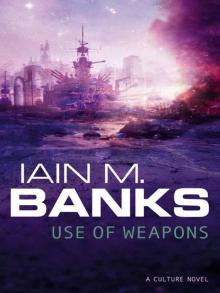 Use of Weapons
Use of Weapons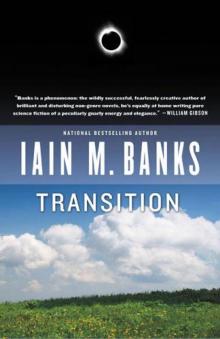 Transition
Transition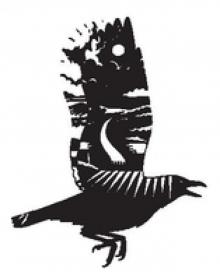 The Crow Road
The Crow Road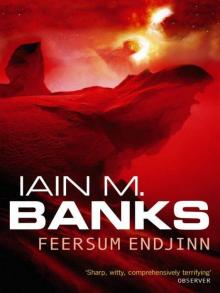 Feersum Endjinn
Feersum Endjinn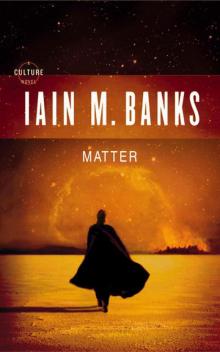 Matter
Matter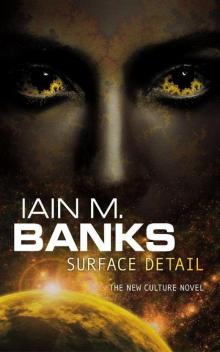 Surface Detail
Surface Detail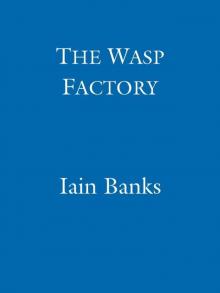 The Wasp Factory
The Wasp Factory Consider Phlebas
Consider Phlebas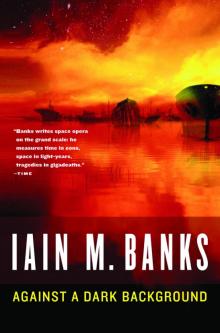 Against a Dark Background
Against a Dark Background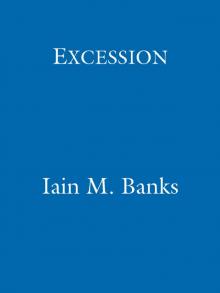 Excession
Excession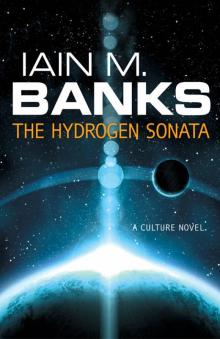 The Hydrogen Sonata
The Hydrogen Sonata The Algebraist
The Algebraist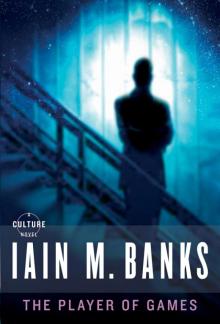 The Player of Games
The Player of Games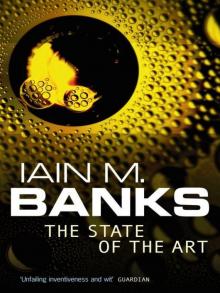 The State of the Art
The State of the Art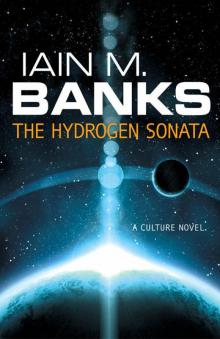 The Hydrogen Sonata c-10
The Hydrogen Sonata c-10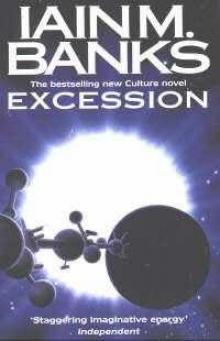 Excession c-5
Excession c-5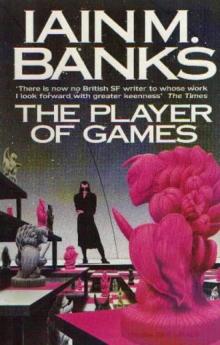 The Player of Games c-2
The Player of Games c-2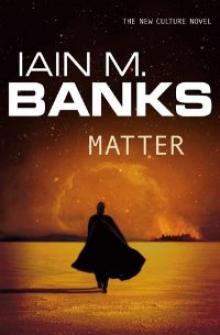 Matter c-8
Matter c-8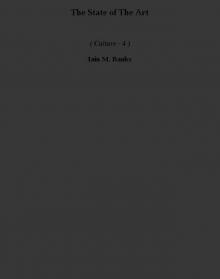 The State of The Art c-4
The State of The Art c-4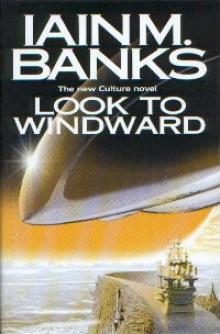 Look to Windward c-7
Look to Windward c-7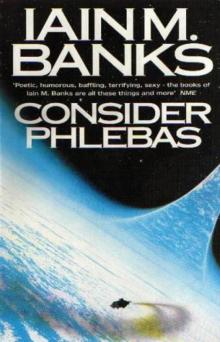 Consider Phlebas c-1
Consider Phlebas c-1